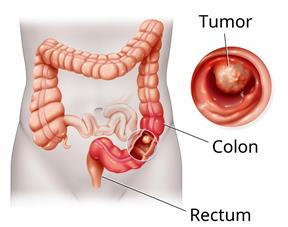Colorectal Cancer: What to Know

Colorectal cancer is a type of cancer that starts in the colon or rectum, which are parts of the large intestine. It happens when a cancerous growth of cells or tissue develops. This growth is called a tumor. The cancer can spread to other parts of the body.
What are the causes?
This cancer is usually caused by abnormal growths called polyps on the inner wall of the colon or rectum. If these polyps aren't treated, they can turn into cancer.
What increases the risk?
You may be more likely to get this type of cancer if:- You're older than 50 years of age.
- You or someone in your family has had colorectal cancer or polyps in the colon.
- You've had cancer and cancer treatments like radiation before.
- You have certain health problems, such as:
- Diabetes.
- Inflammatory bowel diseases, such as ulcerative colitis or Crohn's disease.
- Certain conditions that are passed down in families, like:
- Lynch syndrome.
- Familial adenomatous polyposis.
- Turcot syndrome.
- Peutz–Jeghers syndrome.
- MUTYH-associated polyposis (MAP).
- Cystic fibrosis (CF).
- You're overweight.
- Your diet is:
- High in red meats, such as beef or pork.
- High in precooked, cured, or other processed meat, such as sausages or hot dogs.
- Low in fiber, such as fiber from fruit, vegetables, and whole grains.
- You're not active, you smoke, or you drink a lot of alcohol.
What are the signs or symptoms?
Early on, this cancer often doesn't cause symptoms. As the cancer grows, symptoms may include:- Changes in bowel habits.
- Feeling like the bowel doesn't empty completely after pooping.
- Poop that's thinner than usual, or seeing blood in your poop or in the toilet after pooping. The blood may be bright red or very dark in color.
- Diarrhea, trouble pooping (constipation), or frequent gas pain.
- Anemia or feeling tired all the time.
- Throwing up or feeling like you may throw up.
- Discomfort, pain, bloating, fullness, or cramps in the belly.
- Losing weight without trying.
How is this diagnosed?
Colorectal cancer may be diagnosed based on:- An exam and your medical history.
- Tests. These may include:
- A digital rectal exam. This is an exam of the rectum using a gloved finger.
- A poop (stool) test called a fecal occult blood test.
- Blood tests.
- A biopsy. This is when a small piece of tissue is removed for testing.
- X-rays, CT scans, MRIs, or a PET scan.
- A sigmoidoscopy. This test is done to view the inside of the rectum.
- A colonoscopy. This test is done to view the inside of the colon. During this test, small polyps can be removed, or biopsies may be taken.
- An endorectal ultrasound. This test checks how deep a tumor in the rectum has grown and whether the cancer has spread.
- Stage 0 – The cancer is only in the innermost lining of the colon or rectum and hasn't spread.
- Stage 1 (I) – The cancer has grown into the inner wall of the colon or rectum.
- Stage 2 (II) – The cancer has grown deeper into the wall of the colon or rectum or through the wall. It may have reached nearby tissue or organs.
- Stage 3 (III) – The cancer has spread to nearby lymph nodes or the tissue around them.
- Stage 4 (IV) – The cancer has spread to other parts of the body that aren't near the colon, such as the liver or lungs.
How is this treated?
Treatment depends on the type and stage of the cancer. You may need:- Surgery. In the early stages of the cancer, surgery may be done to remove polyps or small tumors from the colon. In later stages, surgery may be done to remove part of the colon.
- Chemotherapy, which uses medicines to kill cancer cells.
- Targeted therapy. This targets specific parts of cancer cells to block the growth and spread of the cancer.
- Immunotherapy, or biologic therapy. This treatment helps your body's defense system (immune system) fight the cancer.
- Radiation, which uses high-energy rays to kill cancer cells or shrink tumors.
- Radiofrequency ablation. This is when radio waves are used to destroy the tumors that may have spread to other areas of the body, such as the liver.
Follow these instructions at home:
-
Take your medicines only as told.
- Try to eat regular, healthy meals.
- Some of your treatments might affect your appetite.
- If you're having problems eating or with your appetite, ask to meet with an expert in healthy eating called a dietitian.
-
Consider joining a support group. This may help you learn about your diagnosis and manage the stress of having cancer.
-
If you're admitted to the hospital, tell your cancer care team.
Where to find more information
To learn more, go to these websites:- American Cancer Society at cancer.org. Then:
- Click "Search" and type "colorectal cancer."
- Find the link you need.
- National Cancer Institute (NCI): cancer.gov/types/colorectal
Contact a health care provider if:
-
Your diarrhea or trouble pooping doesn't go away.
-
You see blood in your poop or in the toilet.
-
Your bowel habits change.
-
You have increased pain in your belly.
-
You have new tiredness or weakness.
-
You lose weight without trying.
Get help right away if:
-
You have increased bleeding or bright red blood coming from the rectum.
-
You have any belly symptoms that are very bad or can't be controlled.
This information is not intended to replace advice given to you by your health care provider. Make sure you discuss any questions you have with your health care provider.

